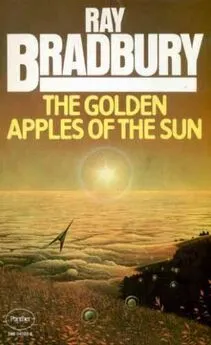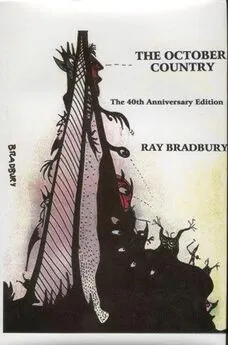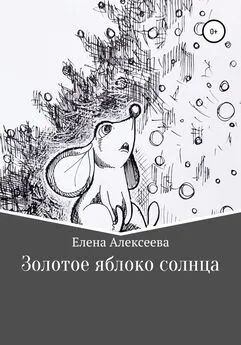Рэй Бредбери - Золотые яблоки солнца (The Golden Apples of the Sun), 1953
- Название:Золотые яблоки солнца (The Golden Apples of the Sun), 1953
- Автор:
- Жанр:
- Издательство:неизвестно
- Год:неизвестен
- ISBN:нет данных
- Рейтинг:
- Избранное:Добавить в избранное
-
Отзывы:
-
Ваша оценка:
Рэй Бредбери - Золотые яблоки солнца (The Golden Apples of the Sun), 1953 краткое содержание
В этом сборнике писатель позволяет себе отойти от научной фантастики, публикуя реалистичные истории, сказки и детективы, а фантастические рассказы сводя к зарисовкам («Вышивание»). Отличная книга, в которой видны, пожалуй, все грани Брэдбери-прозаика. В 2005-м году был переиздан под названием «И грянул гром» в преддверии выхода экранизации этого рассказа.
Золотые яблоки солнца (The Golden Apples of the Sun), 1953 - читать онлайн бесплатно полную версию (весь текст целиком)
Интервал:
Закладка:
He listened to his wrist watch ticking, but with only a small part of his attention.
At last she laughed. "They were joking!"
He shook his head. He felt his head moving from left to right and from right to left, as slowly as everything else had happened. "No. They put a receiver on my truck today. They said, at the alert, if you're working, dump your garbage anywhere. When we radio you, get in there and haul out the dead."
Some water in the kitchen boiled over loudly. She let it boil for five seconds and then held the arm of the chair with one hand and got up and found the door and went out. The boiling sound stopped. She stood in the door and then walked back to where he still sat, not moving, his head in one position only.
"It's all blueprinted out. They have squads, sergeants, captains, corporals, everything," he said. "We even know where to bring the bodies."
"So you've been thinking about it all day," she said.
"All day since this morning. I thought: Maybe now I don't want to be a garbage collector any more. It used to be Tom and me had fun with a kind of game. You got to do that. Garbage is bad. But if you work at it you can make a game. Tom and me did that. We watched people's garbage. We saw what kind they had. Steak bones in rich houses, lettuce and orange peel in poor ones. Sure it's silly, but a guy's got to make his work as good as he can and worth while or why in hell do it? And you're your own boss, in a way, on a truck. You get out early in the morning and it's an outdoor job, anyway; you see the sun come up and you see the town get up, and that's not bad at all. But now, today, all of a sudden it's not the kind of job for me any more."
His wife started to talk swiftly. She named a lot of things and she talked about a lot more, but before she got very far he cut gently across her talking. "I know, I know, the kids and school, our car, I know," he said. "And bills and money and credit. But what about that farm Dad left us? Why can't we move there, away from cities? I know a little about farming. We could stock up, hole in, have enough to live on for months if anything happened."
She said nothing.
"Sure, all of our friends are here in town," he went on reasonably. "And movies and shows and the kids' friends, and…."
She took a deep breath. "Can't we think it over a few more days?"
"I don't know. I'm afraid of that. I'm afraid if I think it over, about my truck and my new work, I'll get used to it. And, oh Christ, it just doesn't seem right a man, a human being, should ever let himself get used to any idea like that."
She shook her head slovly, looking at the windows, the gray walls, the dark pictures on the walls. She tightened her hands. She started to open her mouth.
"I'll think tonight," he said. "I'll stay up a while. By morning I'll know what to do."
"Be careful with the children. It wouldn't be good, their knowing all this."
"I'll be careful."
"Let's not talk any more, then. I'll finish dinner!" She jumped up and put her hands to her face and then looked at her hands and at the sunlight in the windows. "Why, the kids'll be home any minute."
"I'm not very hungry."
"You got to eat, you just got to keep on going." She hurried off, leaving him alone in the middle of a room where not a breeze stirred the curtains, and only the gray ceiling hung over him with a lonely bulb unlit in it, like an old moon in a sky. He was quiet. He massaged his face with both hands. He got up and stood alone in the dining-room door and walked forward and felt himself sit down and remain seated in a dining-room chair. He saw his hands spread on the white tablecloth, open and empty.
"All afternoon," he said, "I've thought."
She moved through the kitchen, rattling silverware, crashing pans against the silence that was everywhere.
"Wondering," he said, "if you put the bodies in the trucks lengthwise or endwise, with the heads on the right, or the feet on the right. Men and women together, or separated? Children in one truck, or mixed with men and women? Dogs in special trucks, or just let them lay? Wondering how many bodies one garbage truck can hold. And wondering if you stack them on top of each other and finally knowing you must just have to. I can't figure it. I can't work it out. I try. but there's no guessing, no guessing at all how many you could stack in one single truck."
He sat thinking of how it was late in the day at his work. with the truck full and the canvas pulled over the great bulk. of garbage so the bulk shaped the canvas in an uneven mound. And how it was if you suddenly pulled the canvas back and looked in. And for a few seconds you saw the white things like macaroni or noodles, only the white things were alive and boiling up, millions of them. And when the white things felt the hot sun on them they simmered down and burrowed and were gone in the lettuce and the old ground beef and the coffee grounds and the heads of white fish. After ten seconds of sunlight the white things that looked like noodles or macaroni were gone and the great bulk of garbage silent and not moving, and you drew the canvas over the bulk and looked at how the canvas folded unevenly over the hidden collection, and underneath you knew it was dark again, and things beginning to move as they must always move when things get dark again.
He was still sitting there in the empty room when the front door of the apartment burst wide. His son and daughter rushed in, laughing, and saw him sitting there, and stopped.
Their mother ran to the kitchen door, held to the edge of it quickly, and stared at her family. They saw her face and they heard her voice:
"Sit down, children, sit down!" She lifted one hand and pushed it toward them. "You're just in time."
The Garbage Collector 1953 (Мусорщик)
Вот как складывался его рабочий день.
Он вставал затемно, в пять утра, и умывался тёплой водой, если кипятильник действовал, а то и холодной. Он тщательно брился, беседуя с женой, которая возилась на кухне, готовя яичницу, или блины, или что там у неё было задумано на завтрак. К шести он ехал на работу и с появлением солнца ставил свою машину на стоянку рядом с другими машинами. В это время утра небо было оранжевым, голубым или лиловым, порой багровым, порой жёлтым или прозрачным, как вода на каменистом дне. Иногда он видел своё дыхание белым облачком в утреннем воздухе, иногда не видел. Но солнце продолжало подниматься, и он стучал кулаком по зелёной кабинке мусоровоза. Тогда водитель, крикнув с улыбкой "хелло!", взбирался с другой стороны на сиденье, и они ехали по улицам большого города туда, где ждала работа. Иногда они останавливались выпить чашку чёрного кофе, потом, согревшись, ехали дальше. Наконец приступали к работе: он выскакивал перед каждым домом из кабинки, брал мусорные ящики, нёс к машине, поднимал крышку и вытряхивал мусор, постукивал ящиком о борт, так что апельсиновые корки, дынные корки и кофейная гуща шлёпались на дно кузова, постепенно его заполняя. Сыпались кости от жаркого, рыбьи головы, кусочки зелёного лука и высохший сельдерей. Ещё ничего, если отбросы были свежие, куда хуже, если они долго лежали. Он не знал точно, нравится ему работа или нет, но так или иначе, это была работа и он её выполнял добросовестно. Иногда его тянуло всласть поговорить о ней, иногда он совершенно выкидывал её из головы. Иногда работа была наслаждением – выедешь спозаранок, воздух прохладный и чистый, пока не пройдёт несколько часов и солнце начнёт припекать, а отбросы – вонять. И вообще, работа как работа: он был занят своим делом, ни о чём не беспокоился, безмятежно смотрел на мелькающие за дверцей машины дома и газоны, наблюдая повседневное течение жизни. Раз или два в месяц он с удивлением обнаруживал, что любит свою работу, что лучшей работы нет во всём мире.
Так продолжалось много лет. И вдруг всё переменилось. Переменилось в один день. Позже он не раз удивлялся как работа могла настолько измениться за каких-нибудь несколько часов.
Он вошёл в комнату, не видя жены и не слыша её голоса, хотя она стояла тут же. Он прошёл к креслу, а она ждала и смотрела, как он кладёт руку на спинку кресла и, не говоря ни слова, садиться. Он долго сидел молча.
– Что-нибудь стряслось? – Наконец её голос проник в его сознание. Она спрашивала в третий или четвёртый раз.
– Стряслось? – Он посмотрел на женщину, которая заговорила с ним. Ну конечно, это же его жена, он её знает, и это их квартира, с высокими потолками и выгоревшими обоями.- Верно, стряслось, сегодня на работе.
Она ждала.
– Когда я сидел в кабине моего мусоровоза. – Он провёл языком по шершавым губам и закрыл глаза, выключая зрение, пока не стало темно-темно – ни малейшего проблеска света, как если бы ты среди ночи встал с постели в пустой тёмной комнате. – Я, наверно, уйду с работы. Постарайся понять.
– Понять! – воскликнула она.
– Ничего не поделаешь. В жизни со мной не случалось ничего подобного. – Он открыл глаза и соединил вместе похолодевшие пальцы. – Это нечто поразительное.
– Да говори же, не сиди так!
Он вытащил из кармана кожаной куртки обрывок газеты.
Читать дальшеИнтервал:
Закладка:




![Нэнси Митфорд - Король-Солнце [The Sun King]](/books/1072357/nensi-mitford-korol-solnce-the-sun-king.webp)
![О Генри - Яблоко сфинкса [The Sphinx Apple]](/books/1076184/o-genri-yabloko-sfinksa-the-sphinx-apple.webp)
![О Генри - Сестры золотого кольца [Sisters of the Golden Circle]](/books/1083389/o-genri-sestry-zolotogo-kolca-sisters-of-the-gol.webp)


